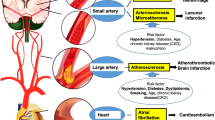Abstract
Although it is clear that hypertension is a primary cause of stroke, there has been recent controversy about blood pressure management after stroke. Recent studies indicate that lowering systemic blood pressure after stroke does reduce the risk of recurrent stroke or vascular events, but other studies provide evidence that blood pressure should not be lowered in the first week after stroke onset. Additional investigations have provided preliminary evidence that raising blood pressure in the first few days after stroke may improve outcome in selective patients. However, other studies have recorded benefit of lowering blood pressure in some patients at the acute stage, whereas still others have identified patients in whom lowering blood pressure even later after stroke may be more harmful than beneficial. The remaining challenge is to identify efficient measures for determining when to lower blood pressure in each case of ischemic stroke.
Similar content being viewed by others
References and Recommended Reading
Schrader J, Luders S, Kulschewski A, et al.: The ACCESS Study: evaluation of acute candesartan cilexetil therapy in stroke survivors. Stroke 2003, 34:1699–1703.
Ahmed N, Wahlgren NG: Effects of blood pressure lowering in the acute phase of total anterior circulation infarcts and other stroke subtypes. Cerebrovasc Dis 2003, 15:235–243.
Semplicini A, Maresca A, Boscolo G, et al.: Hypertension in acute ischemic stroke: a compensatory mechanism or an additional damaging factor? Arch Intern Med 2003, 163:211–216.
Aslanyan S, Fazekas F, Weir CJ, et al.: Blood pressure course during the acute phase of stroke is strongly associated with outcome [abstract]. Stroke 2003, 34:245.
Olieviera-Filho J, Silva SC, Trabuco CC, et al.: Detrimental effect of blood pressure reduction in the first 24 hours of acute stroke onset. Neurology 2003, 61:1047–1051.
Johnston KC, Mayer SA: Blood pressure reduction in ischemic stroke: a two-edged sword? Neurology 2003, 61:1030–1031.
Vlcek M, Schillinger M, Lang W, et al.: Association between course of blood pressure within the first 24 hours and functional recovery after acute ischemic stroke. Ann Emerg Med 2003, 42:619–626.
Leonardi-Bee J, Bath PM, Phillips SJ, et al.: Blood pressure and clinical outcomes in the international stroke trial. Stroke 2002, 33:1315–1320.
Adams HP, Adams RJ, Brott T, et al.: Guidelines for the early management of patients with ischemic stroke: a scientific statement from the stroke council of the American Stroke Association. Stroke 2003, 34:1056–1083.
Aslanyan S, Fazekas F, Weir CJ, et al.: Effect of blood pressure during the acute period of ischemic stroke on stroke outcome: a tertiary analysis of the GAIN International Trial. Stroke 2003, 34:2420.
Willmot M, Leonardi-Bee J, Bath PM: High blood pressure in acute stroke and subsequent outcome: a systematic review. Hypertension 2004, 43:18–24.
Astrup J, Symon L, Branston NM, Lassen NA: Cortical evoked potential and extracellular K+ and H+ at critical levels of brain ischemia. Stroke 1977, 8:51–57.
Baron JC, Marchal G: Functional imaging in vascular disorders. In Brain Mapping: The Disorders. Edited by Mazziotta JC, Toga AW, Frackowiak RS. San Diego: Academic Press; 2000:299–311.
Hillis AE, Wityk RJ, Tuffiash E, et al.: Hypoperfusion of Wernicke’s area predicts severity of semantic deficit in acute stroke. Ann Neurol 2001, 50:561–566.
Wise G, Sutter R, Burkholder J: The treatment of brain ischemia with vasopressor drugs. Stroke 1972, 3:135–140.
Rordorf G, Cramer SC, Efird JT, et al.: Pharmacological elevation of blood pressure in acute stroke. Stroke 1997, 28:2133–2138.
Rordorf G, Koroshetz W, Ezzeddine MA, et al.: A pilot study of drug-induced hypertension for treatment of acute stroke. Neurology 2001, 56:1210–1213.
Hillis AE, Ulatowski JA, Barker PB, et al.: A pilot randomized trial of induced blood pressure elevation: Effects on function and focal perfusion in acute and subacute stroke. Cerebrovasc Dis 2003, 16:236–246.
Martinsson L, Wahlgren NG: Safety of dexamphetamine in acute ischemic stroke: a randomized, double-blind controlled dose-escalation trial. Stroke 2003, 34:475–481.
PROGRESS Collaborative Group: Randomized trial of a perindopril-based blood pressure-lowering regimen among 6105 individuals with previous stroke or transient ischemic attack. Lancet 2001, 358:1033–1041.
Messerli FH, Hanley DF Jr, Gorelick PB: Blood pressure control in stroke patients: what should the consulting neurologist advise?. Neurology 2002, 1:23–25.
Chapman N, Huxley R, Anderson C, et al.: Effects of perindopril-based blood pressure lowering regimen on the risk of recurrent stroke according to stroke subtype and medical history: the PROGRESS trial. Stroke 2004, 35:116–121.
Dahlof B, Devereux RB, Kjeldsen SE, et al.: Cardiovascular morbidity and mortality in the Losartan Intervention For Endpoint reduction in hypertension study (LIFE): a randomized trial against atenolol. Lancet 2002, 359:995–1003.
Forette F, Seux ML, Staessen JA, et al.: Prevention of dementia in randomized double-blind placebo-controlled Systolic Hypertension in Europe (Syst-Eur) Trial. Lancet 1998, 352:1347–1351.
Rothwell PM, Howard SC, Spence JD: Relationship between blood pressure and stroke risk in patients with symptomatic carotid occlusive disease. Stroke 2003, 34:2583–2590.
Author information
Authors and Affiliations
Rights and permissions
About this article
Cite this article
Hillis, A.E. Systemic blood pressure and stroke outcome and recurrence. Curr Atheroscler Rep 6, 274–280 (2004). https://doi.org/10.1007/s11883-004-0058-x
Issue Date:
DOI: https://doi.org/10.1007/s11883-004-0058-x




